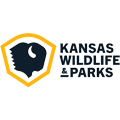
AGE REQUIREMENTS FOR KANSAS BOATERS
Any person born on or after January 1st, 1989, who is more than 12 years of age, is required to successfully complete a Boating Safety Course in order to legally operate any motorized boat or PWC within the state.
Excellent!
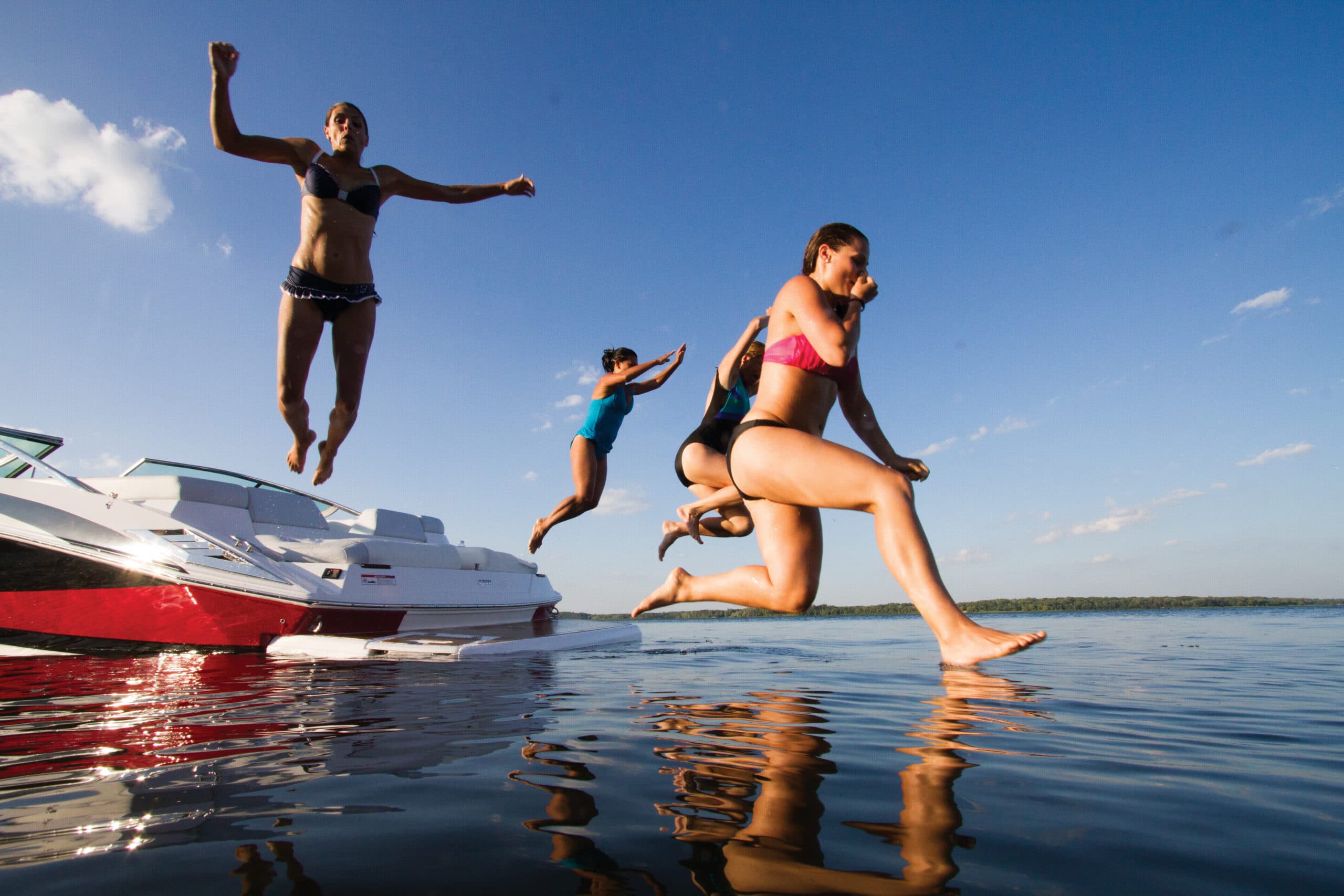

Official Kansas Boating Course
The BOATsmart! Kansas Boating Safety Course is approved and accredited by the Kansas Department of Wildlife and Parks. With more than 3,000 Five Star Reviews, we’re proud to be recognized as an official Kansas State Boating Course and the choice of boaters in Kansas.
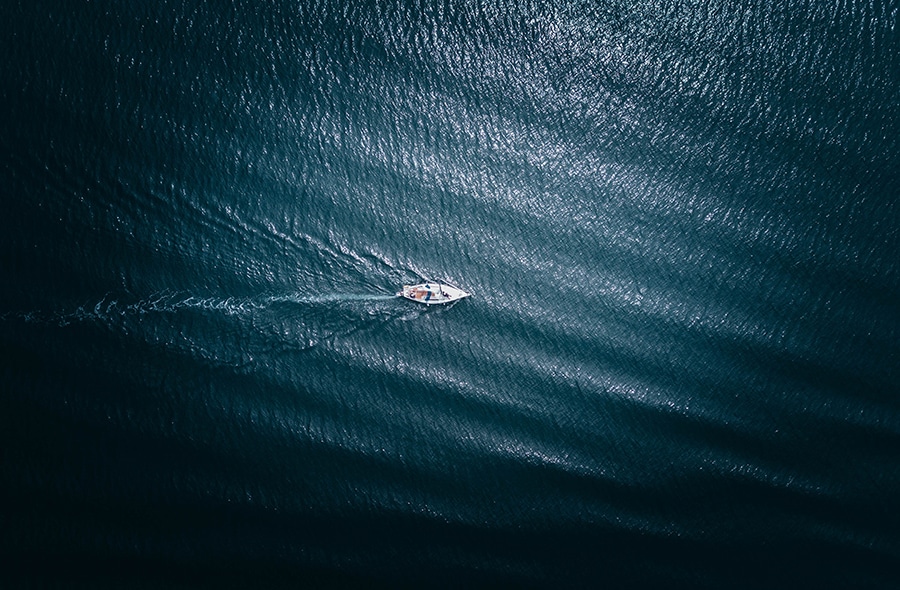

NASBLA & Coast Guard Approved
The BOATsmart! Kansas Boating Safety Course is officially recognized by the United States Coast Guard as meeting the standards of the National Recreational Boating Safety Program. BOATsmart!’s online Kansas Boating Safety Course is approved by the National Association of State Boating Law Administrators (NASBLA) as it meets and exceeds U.S. Boating Education Standards. NASBLA develops education standards for boating safety and represents boating law administrators in all 50 states and U.S. territories.
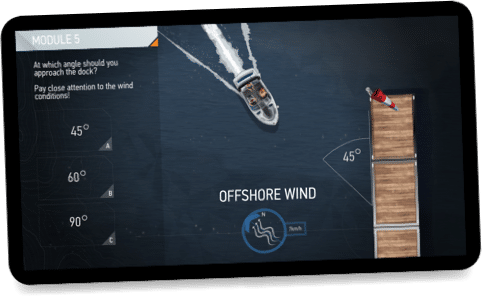
Watch, Listen & Learn
From anywhere, on any device at any time.
Our animated and narrated Boating Safety Course is perfect for all ages. Study from your Smartphone, Tablet or Desktop and switch between devices at any time. BOATsmart! automatically tracks your progress so you can study at your own pace.
KANSAS BOATING LICENCE REQUIREMENTS
WHAT IS A KANSAS BOATING SAFETY CERTIFICATE
A Kansas Boater Education Card proves that you’ve obtained the knowledge needed to safely operate a motorized boat on Kansas waterways. All boat operators born on or after January 1st, 1989 are required to get certified to legally operate a motorized boat or PWC within the state.
WHERE CAN I GET MY KANSAS BOATING LICENSE?
You can get your Kansa Boater Education Card by completing the Official BOATsmart! Course online. Once you successfully complete the online study guide and final exam, you can print a temporary card immediately. BOATsmart! will mail your permanent card within 4 weeks.
HOW OLD DO I HAVE TO BE TO GET A BOATER CARD IN KANSAS?
There is no minimum age to complete the Kansas Boater Education Card and get certified.
AGE AND HORSEPOWER RESTRICTIONS
Boaters who are less than 12 years of age are not permitted to operate a motorized boat within the state, even if they have obtained a Boater Education Card.
Operators who are more than 12 years of age may not operate a boat unless they have obtained a Kansas Boater Education Card or are directly supervised on board the boat by an adult who is at least 18 years of age, or are exempt from the boater education requirement.
HOW LONG DOES IT TAKE TO GET MY KANSAS BOATING LICENSE?
It takes a minimum of 3 hours to get your Kansas Boater Education Card online. Once you’ve completed the online course and official test, you can print a temporary card and go boating right away. Your permanent card will be mailed to you by BOATsmart! within 4 weeks.
CAN I GET REFRESHER LESSONS AFTER TAKING THE KANSAS BOATING COURSE?
Yes. Boaters in the state of Kansas can keep up-to-date on the latest boating regulations with the free BOATsmart! Knowledge Base. Learn about boating equipment requirements, navigation and right-of-way regulations and restrictions that may apply on Kansas waterways to be sure that you’re safe and confident on the water.
DO I NEED A LICENSE TO RENT A BOAT IN KANSAS?
Boat operators in Kansas who were born on or after January 1st, 1989 are required to successfully complete a Boating Safety Course in order to legally operate any motorized boat or PWC within the state.
Boating and alcohol in Kansas
KANSAS BOATING AND ALCOHOL LAWS
It is illegal to operate any boat on Kansas’ waterways while they are under the influence of alcohol, drugs or a combination thereof.
In Kansas, a person is considered to be under the influence if:
- They are under the influence of alcohol to a degree that they are incapable of operating safely.
- They are under the influence of any controlled substance, any other drug, or any combination of alcohol, controlled substance, or drugs that renders them incapable of operating safely.
- They have a Breath or Blood Alcohol Concentration (BAC) level of 0.08% or higher at the time or within 2 hours after the person operated or attempted to operate the boat.
- They are a minor (under 21 years of age) and they have a BAC level of 0.02% or higher at the time or within 2 hours after the person operated or attempted to operate the boat.
FINES AND PENALTIES
In Kansas, a person convicted of operating a boat while under the influence will be subject to the following penalties:
First conviction:
- Imprisonment for up to 1 year and/or a fine up to $500.
Second or subsequent conviction:
- Imprisonment for a minimum of 90 days and up to 1 year and, in the court’s discretion, a fine of not less than $100 nor more than $500.
PENALTIES FOR MINORS
A person less than 21 years of age who has a BAC of 0.02% or greater but less than 0.08% will have their boating privileges suspended for 30 days, upon a first conviction. Boating privileges may be suspended for up to 90 days upon a second or subsequent conviction.
Kansas Boating Age Requirements
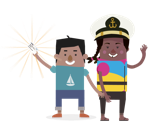
UNDER 12 YEARS OF AGE
Boaters who are less than 12 years of age are not permitted to operate a motorized boat within the state, even if they have obtained a Boater Education Certificate.
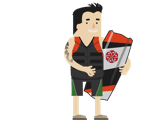
OVER 12 YEARS OF AGE
Operators who are more than 12 years of age may not operate a boat unless they have obtained a Kansas Boater Education card or are directly supervised on board the boat by an adult who is at least 18 years of age, or are exempt from the boater education requirement.
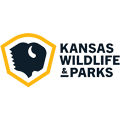
Kansas's Boating Fines

Operating under the influence
Up to $500

Boater Education Card Violations
Up to $500
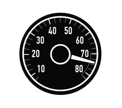
Reckless or Negligent Boat Operation
Up to $500

Life jacket violations
Up to $500

Failure to Report a Boat Accident
Up to $500
General Kansas boating FAQs
WHO REGULATES BOATING LAWS IN KANSAS?
The Kansas Department of Wildlife and Parks is responsible for regulating boating laws in the state of Kansas.
Boating Emergencies:
Call 911 to report a boating emergency in Kansas
WHO ENFORCES KANSAS’ BOATING LAWS?
Boating laws and regulations in Kansas are enforced by:
- Officers of the Kansas Department of Wildlife and Parks
- All other peace officers
- The U.S. Coast Guard (on federal waters)
Law enforcement officers have the authority to stop and board vessels to ensure they are in compliance with state and federal laws.

How to register a boat in Kansas
KANSAS BOAT REGISTRATION
In order to legally operate a motorized boat or sailboat in the state of Kansas, you must obtain a Certificate of Number (registration card) and validation decals. The Certificate of Number must be carried on board and be available for inspection by an enforcement officer during boat operation.
Sailboards, stand up paddleboards, personal watercraft (PWCs), kayaks, and canoes are considered boats in the state of Kansas.
You can register your boat online, by mail, or in person. For new or re-issued boat registration, an application form is available to download at www.ksoutdoors.com or from the nearest marine dealer, county clerk’s office, or Kansas Department of Wildlife and Parks (KDWP) State Park or office. Fill out the application completely and mail it along with the required documents and fee.
Exemptions:
- Boats without any kind of motor or sail (human-powered boats).
- Boats which have been registered in another state, and are using Kansas waters for 60 consecutive days or less.
REGISTRATION RENEWAL
Boat owners can register their boat in person at a State Park, a Regional Office or with a Boat Registration Agent. Kansas boat registration is valid for a period of 3 years. Renewal notices are mailed prior to the expiration date. If you’ve had a change of address or have not received a renewal notice by mail, please contact Boating Registration at the KDWP, Pratt Operation office.
DO I NEED BOAT INSURANCE IN KANSAS?
Boats in Kansas are not required to be insured, however it is recommended.
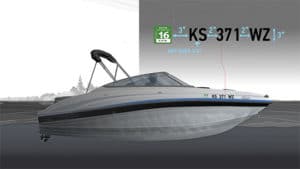
Boats in Kansas are required to correctly display their registration number and validations stickers.
Registration numbers and stickers must be displayed as follows:
- The numbers must be applied as a decal, painted or permanently affixed to each side of the boat’s bow (boat owners are not permitted to display any other numbers in this area).
- The numbers must be in bold block letters that are at least 3 inches high and in a color that contrasts with the color of the boat.
- The numbers must be separated from the letters by a hyphen or by an equivalent space.
- The numbers must be read from left to right.
- Validation decals must be affixed on both sides of the boat and placed 3 inches aft of the numbers.
Note: Sailboards do not require registration numbers to be displayed. However, the decal must be attached to the front half of the top of the sailboard.
Kansas lifejacket laws

KANSAS LIFE JACKET LAWS
Kansas law requires all boats to have at least one wearable life jacket or PFD of proper size, in serviceable condition, not in an enclosed compartment, and readily accessible for each person on board the boat or being towed. This includes stand up human-powered boats and paddleboards.

BOATS MORE 16 FT IN LENGTH
Boats 16 feet or longer, except canoes and kayaks, also must carry one, Type IV (throwable) flotation device that is in serviceable condition and not in an enclosed compartment.

PERSONAL WATERCRAFT
Operators of personal watercraft, passengers and anyone being towed behind a vessel must wear a U.S. Coast Guard-Approved Type I, II, III or V PFD. Inflatable lifejackets are excluded. Life jackets worn by a persons being towed are required to be rated for towing activities

CHILDREN 12 YEARS OF AGE AND UNDER
In Kansas, passengers 12 years of age or under are required to wear a Coast Guard-approved, Type I, II or III life jacket while aboard or being towed by a boat. A life belt or ring will not meet the requirement.
Boating Restriction Regulations
RECKLESS OR NEGLIGENT BOAT OPERATION
It is illegal in the state of Kansas to operate any boat or to manipulate any water-skis, aquaplane or similar device in a careless, reckless or negligent manner so as to endanger the life, limb or property of any person.
Examples of reckless or negligent operation include:
- Operating within 200 feet of a designated swimming area.
- Weaving through congested traffic at more than idle speed.
- Jumping the wake of another boat when unreasonably close to the other boat.
- Waiting until the last possible moment to swerve to avoid a collision.
- Creating a hazardous wake.
- Towing a waterskier in a restricted area or where an obstruction exists.
- Operating a boat in violation of buoy restrictions.
- Failing to observe the navigation rules.
Note: Only a motorized boat used for fishing may be operated in a mooring or launching non-boating area.
SPEED RESTRICTIONS
- Motorized boats on state lakes must be operated at ‘No Wake’ speed if they are required by posted notice.
- Boats can not be operated within 200 feet of any area posted specifically for swimming and delineated by buoys or other markers.
- Boats shall be operated at ‘No Wake’ speeds within 200 feet of a boat ramp, boat dock, boat storage or concessionaire’s facilities.
Environmental Protection
NON-NATIVE AQUATIC SPECIES
Non-native aquatic species, plants, fish and animals are invading Kansas waters. These pests can increase dramatically under the right conditions, displacing native species, clogging waterways, and impacting navigation and recreation.
Once introduced, they are nearly impossible to eliminate, and can be accidentally transported by recreational boaters when caught in propellers, intakes or attached to hulls.
Be sure to report new infestations of non-native aquatic species to the U.S. Fish and Wildlife Service at (209) 946-6400 or report to Kansas Department of Wildlife and Parks.
HELP PREVENT THE SPREAD OF NON-NATIVE SPECIES
- Inspect all surfaces of your boat and remove aquatic plants or animals before leaving any body of water.
- Ensure you flush raw-water cooling systems and clean sea-strainers before moving your boat from one body of water to another.
- Empty and dry any buckets before leaving a body of water.
- Remove any plant fragments from bait wells, fishing gear, trailers, dive gear or props.
- Dispose of plant fragments and bait into a garbage receptacle on land.
- Avoid chopping vegetation with your boat’s propeller.
- Clean and dry all live-wells prior to transporting your boat.
- Drain all water from your motor and bilge and dry all areas. t.
- Thoroughly wash your boat, including the hull, before putting it into a new body of water.
- Refer to specific drying times.
Infestations of non-native species
Report new infestations of non-native aquatic species to the U.S. Fish and Wildlife Service at (209) 946-6400.
KANSAS AIS REPORTING
Visit https://ksoutdoors.com/Fishing/Aquatic-Nuisance-Species/Report-an-Aquatic-Nuisance-Species to easily report sightings of AIS in Kansas.
The Sunflower State, Blue Waters, Good Times

Kansas Boating Destinations
BEST BOATING LAKES
Where you should plan to launch your boat and hit the water will depend on what area of Kansas state you plan on visiting. But to help you get the ball rolling, we thought we’d mention just a few of our favorite places to hit the water to go boating in Kansas. These waterways are popular for a reason: Cheney Reservoir, El Dorado Lake, Tuttle Creek Lake, Perry Lake and Pomona Lake.
NATIONAL AND STATE PARKS
What can you expect from the 24 State Parks located in Kansas? Well, for starters, you’ll find over 32,000 acres of land to explore and over 130,000 surface-acres of water to access for boating, paddling and fishing activities! You’ll find landscapes with everything from vast grasslands to rugged canyons here! Start your Kansas outdoor adventure by going sight-seeing, hiking, camping, boating or climbing.
A few of the most popular State Parks include Cheney State Park and it’s prime conditions for sailing, wind surfing or just relaxing on a beach. There’s also Tuttle Creek State Park and it’s awesome fishing, beaches and boating opportunities. Last but not least (although definitely the driest), is the famous Tallgrass National Preserve in Kansas. Visit Kansas State Parks for more information about the boating opportunities, boat launch access points or the boating restrictions that may be in place in the park you plan on visiting.

